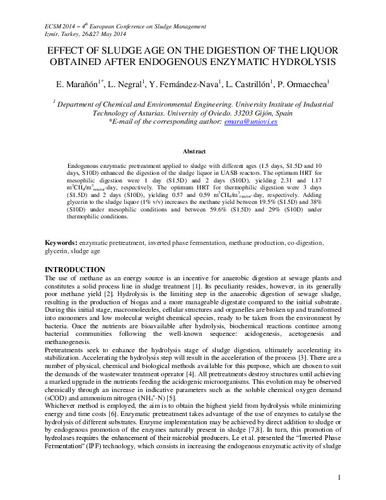Effect of sludge age on the digestion of the liquor obtained after endogenous enzymatic hydrolysis
Palabra(s) clave:
Enzymatic pretreatment
Inverted phase fermentation
Methane production
Co-digestion
Glycerin
Sludge age
Fecha de publicación:
Resumen:
Inverted Phase Fermentation is a method for thickening sewage sludge that results in a clarified phase beneath a thickened fraction. An increased hydrolysis rate is obtained in both phases. The liquid phase or liquor was digested in UASB reactors. The optimum methane yield was obtained for hydraulic retention time of 1 day (0.32 m3 CH4/kg VS, 2.31 m3 CH4/m3reactor day). When this liquor was co-digested with 1% (v/v) crude glycerin, the optimum methane yield was obtained when operating at hydraulic retention time of 2 days (0.67 m3 CH4/kg VS, 2.76 m3CH4/m3reactor day). Co-digestion of the liquor with crude glycerin not only improved specific methane yield, but also organic matter biodegradation (up to 89% total COD and up to 76% VS removal).
Inverted Phase Fermentation is a method for thickening sewage sludge that results in a clarified phase beneath a thickened fraction. An increased hydrolysis rate is obtained in both phases. The liquid phase or liquor was digested in UASB reactors. The optimum methane yield was obtained for hydraulic retention time of 1 day (0.32 m3 CH4/kg VS, 2.31 m3 CH4/m3reactor day). When this liquor was co-digested with 1% (v/v) crude glycerin, the optimum methane yield was obtained when operating at hydraulic retention time of 2 days (0.67 m3 CH4/kg VS, 2.76 m3CH4/m3reactor day). Co-digestion of the liquor with crude glycerin not only improved specific methane yield, but also organic matter biodegradation (up to 89% total COD and up to 76% VS removal).
Descripción:
4th European Conference on Sludge Management 26th-27th May 2014, Izmir (Turkey)
Patrocinado por:
European Union Seventh Framework Programme (FP7-ENV.2010.3.1.1-2 ENV) under Grant Agreement no. 265269. Project: END-O-SLUDG
Colecciones
Ficheros en el ítem





